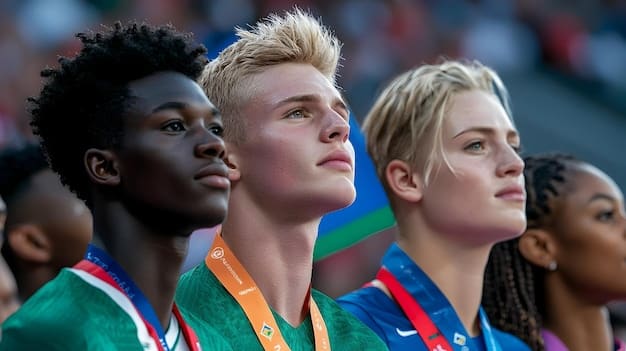The Future of the Olympics: Innovations & Anticipated Changes

The future of the Olympics is set to be reshaped by technological advancements, evolving athlete and fan engagement, and a renewed emphasis on sustainability and inclusivity, offering a dynamic and more accessible global spectacle as the Games progress into the next decade.
The Olympic Games, a global spectacle of athletic prowess and cultural celebration, have consistently evolved since their inception. As we look towards 2025 and beyond, the pivotal question arises: The Future of the Olympics: What Changes Can We Expect in the Coming Years? This exploration delves into the anticipated transformations, from technological integration to sustainability efforts, aiming to project a landscape where ancient traditions meet modern innovations, shaping an event that resonates with new generations while upholding its timeless spirit.
Technological Integration and Enhanced Fan Experience
The digital revolution fundamentally alters how we consume media and engage with events. For the Olympics, this translates into a concerted effort to leverage technology for deeper fan engagement, real-time data, and immersive experiences, transforming passive viewing into active participation.
Consider the potential for augmented and virtual reality. Imagine watching a gymnastics routine from the perspective of an athlete, or experiencing a swimming race as if you were in the lane next to the competitors. This level of immersion goes far beyond traditional broadcasts, offering unparalleled insights and emotional connections for audiences worldwide.
Virtual and Augmented Reality Experiences
VR and AR are no longer niche technologies; they are poised to become central to the Olympic viewing experience. The adoption of these platforms allows for dynamic storytelling and personalized content delivery, catering to individual preferences and accessibility needs.
- Enhanced broadcast options providing 360-degree views.
- Interactive overlays with real-time statistics and athlete biographies.
- Virtual fan zones allowing global interaction and unique perspectives.
Beyond the living room, in-venue experiences will also be revolutionized. Smart stadiums, equipped with omnipresent connectivity and interactive screens, could provide fans with instant replays from multiple angles, dietary information for vendors, or even direct links to merchandise sales. The aim is to create a seamless, integrated experience that anticipates and meets every fan’s need, making their attendance exceptionally memorable and convenient.
The integration of advanced data analytics will also play a crucial role. Broadcasters and official partners can utilize AI to analyze viewing patterns, content preferences, and social media sentiment, enabling them to tailor offerings, optimize schedules, and personalize marketing efforts. This data-driven approach ensures that content remains relevant and engaging, crucial for retaining and attracting audiences in an increasingly fragmented media landscape.
Ultimately, technology in the Olympics is not just about flash; it’s about facilitating deeper connections between athletes, fans, and the spirit of the Games. It’s about making the event more accessible, understandable, and profoundly personal, extending its reach far beyond the traditional athletic arena and into the digital realm where new generations reside.
Sustainability and Environmental Responsibility
In an era defined by climate concern and environmental consciousness, the sustainability footprint of the Olympic Games is under increasing scrutiny. Future editions are expected to prioritize eco-friendly practices, aiming for carbon neutrality, waste reduction, and the promotion of green initiatives.
Host cities are now being evaluated not just on their infrastructure, but on their commitment to sustainability. This includes utilizing existing venues, minimizing new construction, and ensuring that any new builds are designed with longevity and repurposing in mind.
Green Infrastructure and Legacy Planning
The concept of “legacy” has expanded beyond just economic benefits to encompass environmental and social impacts. This shift emphasizes creating lasting positive change rather than temporary spectacles, promoting ecological balance.
- Emphasis on renewable energy sources for venues and operations.
- Comprehensive waste management and recycling programs.
- Promotion of public transportation and active mobility solutions.
Beyond the physical infrastructure, the operational aspects of the Games are also being re-evaluated. Supply chains are scrutinized for ethical sourcing, with focus on local produce and sustainable materials. Water conservation, biodiversity protection, and air quality management are becoming integral to planning and execution, reflecting a holistic approach to environmental stewardship.
Furthermore, the International Olympic Committee (IOC) is actively encouraging host cities to become catalysts for broader urban transformation. This means supporting initiatives that lead to more sustainable cities long after the Games conclude, such as investing in green spaces, improving public health infrastructure, and fostering community engagement in environmental causes. The Games are evolving from a temporary event into a permanent force for good, championing global environmental responsibility.
Public awareness campaigns related to sustainability will also intensify. Athletes, as influential figures, are increasingly encouraged to become advocates for environmental protection, using their platforms to inspire millions to adopt greener lifestyles. This collective effort underscores a commitment to planetary health, ensuring the Olympics contribute positively to the global environmental discourse rather than simply extracting resources.

Shifting Athlete Representation and Inclusivity
The Olympic Games have always symbolized global unity, yet criticisms regarding representation and inclusivity have persisted. The future will likely see a more concerted effort to ensure athletes from diverse backgrounds are not only present but feel genuinely represented and supported, fostering a more equitable playing field.
This goes beyond gender parity, extending to socioeconomic status, disability, and sexual orientation. Initiatives aimed at lowering financial barriers to participation and providing robust support systems for all athletes are gaining traction, moving towards a truly universal model.
Breaking Down Barriers
Efforts to make sports more accessible are critical. This includes developing sports infrastructure in underserved regions and providing pathways for talent development, ensuring a wider pool of athletes can aspire to compete.
- Increased programs for athletes from developing nations.
- Enhanced support for para-athletes and adaptive sports integration.
- Commitment to mental health and well-being resources for competitors.
The discourse surrounding athlete mental health has significantly progressed. Future Games will feature more comprehensive psychological support, acknowledging the immense pressure placed on competitors. Initiatives to destigmatize mental health challenges and provide accessible resources are becoming standard, reflecting a holistic approach to athlete welfare.
Moreover, the concept of “athlete voice” is growing stronger. Athletes are increasingly recognized not just as performers, but as stakeholders in the Olympic movement, with their perspectives on issues ranging from event formats to human rights gaining prominence. This greater involvement ensures that decisions reflect the realities and needs of those who dedicate their lives to sport.
The very definition of who is an “athlete” may also broaden, potentially incorporating new disciplines or formats that appeal to a wider demographic. This embracing of diverse forms of athleticism ensures the Games remain relevant and exciting, reflecting the evolving landscape of sports and performance across various cultures and communities.
Urban Integration and Host City Transformation
The relationship between the Olympic Games and their host cities is undergoing a profound transformation. Rather than simply building temporary venues, future Games are expected to be deeply integrated into urban planning, serving as catalysts for long-term development and positive change for residents.
This means cities will leverage the Games as an opportunity to accelerate existing urban development projects, improve public infrastructure, and enhance the quality of life for their citizens, ensuring a lasting positive legacy.
The focus is shifting from a “build-it-new” approach to a “use-what-you-have” philosophy. Existing facilities will be repurposed and upgraded, reducing costs and environmental impact, while new constructions will be designed with clear post-Games utilization plans, such as affordable housing or public parks. This pragmatic strategy ensures that the considerable investment in the Games benefits the community for decades.
Leveraging Existing Infrastructure
Host city selection is increasingly influenced by the ability to utilize current facilities and minimize new builds. This approach is economically sound and environmentally responsible.
- Prioritizing use of pre-existing sports venues.
- Developing temporary structures that can be easily dismantled or reused.
- Implementing urban regeneration projects tied to Olympic developments.
The hosting model is also evolving to potentially involve multiple cities or regions, rather than concentrating all events in a single metropolitan area. This distributed model can ease the burden on any one city, spread the economic benefits more widely, and allow for a more efficient use of varied specialized venues.
Engagement with local communities is also becoming paramount. Host cities are actively seeking input from residents on how the Games can best serve their needs and create a tangible, beneficial legacy. This participatory approach fosters a sense of ownership and ensures that the Games genuinely contribute to urban improvement, rather than being perceived as an imposition.
Ultimately, the future of the Olympics will see cities and the Games as symbiotic partners, where the event acts as a powerful accelerator for planned urban development, leaving behind a legacy of improved infrastructure, enhanced public services, and a revitalized urban landscape for all residents to enjoy long after the closing ceremony.
Evolution of Sports and Event Formats
The traditional Olympic program has faced calls for modernization to remain relevant to younger audiences and reflect the evolving landscape of global sports. Expect to see a greater willingness to embrace new, dynamic disciplines and experiment with event formats.
This shift is driven by a desire to capture new viewership segments and offer a more diverse range of athletic spectacles, ensuring the Games remain a premier global sporting event that resonates with contemporary cultural trends.
Introducing New Disciplines and Disciplines
New sports like skateboarding, surfing, and sport climbing have already been successfully integrated. This trend will likely continue, with potential additions from urban sports, esports, and other emerging athletic pursuits.
The criteria for inclusion often consider global appeal, youth engagement, and gender equality, aligning the Games with current athletic trends.
- Potential inclusion of esports as medal events.
- Integration of urban sports with wider youth appeal.
- Flexible event scheduling to maximize viewership across time zones.
Beyond just adding new sports, existing disciplines may also see format changes to increase excitement and predictability. This could involve shorter, more intense competitions or new rule sets designed to enhance spectator experience. The goal is to maximize appeal while upholding the integrity and traditions of the respective sports, finding a proper balance between tradition and innovation.
The rise of digital sports and esports presents a particularly interesting challenge and opportunity. While traditional sports will remain at the core, the immense popularity and global reach of competitive gaming cannot be ignored. Discussions are ongoing regarding how these digital forms of competition could be integrated, either within the main Olympic framework or as parallel events that complement the traditional Games, engaging a whole new demographic.
Ultimately, the evolution of Olympic sports is about relevance. It’s about ensuring the Games remain vibrant, exciting, and reflective of a dynamic global sporting culture, attracting athletes and fans from every corner of the world and continually inspiring future generations to pursue excellence and passion in new and compelling ways.
Financial Models and Economic Viability
The substantial costs associated with hosting the Olympic Games have raised concerns about their economic viability for potential host cities. The future will likely necessitate more sustainable financial models, moving away from reliance on massive public expenditures towards more balanced and innovative funding mechanisms.
This involves optimizing revenue streams, controlling expenditures, and fostering public-private partnerships that share the financial burden and risk, ensuring the Games deliver economic benefits without crippling debt.
Innovative Funding and Revenue Streams
Exploring diverse revenue streams is crucial. This includes leveraging digital rights, robust sponsorship deals, and potentially, greater commercialization of certain aspects of the Games.
- Increased emphasis on private investment and corporate sponsorships.
- Diversification of revenue through digital content and merchandise.
- More rigorous cost-benefit analyses for bidding cities to ensure economic prudence.
The IOC is also keen to streamline the bidding process itself, making it less costly and more collaborative. This involves working closely with potential host cities to develop proposals that are financially sound and strategically aligned with long-term urban development plans. The aim is to create a more attractive proposition for cities, mitigating the adverse financial risks that have deterred many in the past.
There’s also a growing exploration of multi-city or even regional hosting, which can significantly distribute infrastructure costs and operational expenses across a wider geographical area. This model enhances the financial feasibility for hosts and opens the door for a broader range of cities to consider bidding for the Games, promoting economic balance.
Furthermore, post-Games legacy planning will feature stronger economic components. This includes creating self-sustaining venues, attracting tourism, and stimulating local economies through sustainable business practices. The goal is to ensure that the initial investment in the Games translates into long-term economic prosperity for the host region, ultimately increasing the Games’ overall value proposition and viability.
Governance and Ethical Frameworks
The integrity of the Olympic Games, fundamental to their global appeal, frequently faces challenges from issues like doping, corruption, and political interference. Future iterations of the Games will place an even greater emphasis on robust governance structures, enhanced transparency, and stringent ethical frameworks to uphold their credibility and fairness, essential for public trust.
This includes strengthening anti-doping measures, implementing stricter controls against bribery, and ensuring that decision-making processes within the Olympic movement are clear, accountable, and independent from undue influence.
The commitment to clean sport remains paramount. Advances in anti-doping science and testing methodologies will continue to evolve, aiming to catch cheats and protect the integrity of athletic performance. More proactive intelligence gathering and collaboration with law enforcement agencies are also expected to deter illicit activities, maintaining a level playing field.
Ensuring Fairness and Transparency
Addressing ethical concerns proactively is vital for maintaining the Olympic movement’s reputation. This involves comprehensive oversight mechanisms and clear codes of conduct for all stakeholders, upholding universal standards of sporting ethics.
- Strengthening independent anti-doping authorities and testing protocols.
- Increased transparency in bidding and organizational processes.
- Enhancing athlete welfare and protection from abuse or exploitation.
Athlete welfare, particularly concerning safeguarding from abuse and harassment, is gaining critical attention. Future Games will feature more robust mechanisms for reporting, investigating, and addressing instances of misconduct, ensuring a safe and supportive environment for all participants. This commitment reflects a broader societal shift towards prioritizing the well-being of individuals in all professional settings.
Moreover, the relationship between sport and politics will be continually navigated. The IOC’s stance on neutrality, while complex, will likely be reinforced by clear guidelines on athlete expression and protest within established frameworks, balancing freedom of speech with the need to maintain the non-political nature of the Games themselves, a fine line to tread in an increasingly polarized world.
Ultimately, the future of Olympic governance is about reinforcing trust. It’s about demonstrating an unwavering commitment to fair play, ethical conduct, and accountability at every level, ensuring that the Olympic spirit remains untainted and continues to inspire generations with its ideals of excellence, friendship, and respect, a foundational element for its global appeal and longevity.
| Key Change | Brief Description |
|---|---|
| 📱 Tech Integration | Leveraging VR/AR and data analytics for immersive fan experiences. |
| 🌳 Sustainability Focus | Prioritizing eco-friendly practices, carbon neutrality, and green infrastructure. |
| 🌍 Inclusivity & Diversity | Ensuring broader representation, athlete welfare, and mental health support. |
| 🎮 Evolving Sports | Introduction of new disciplines like esports and urban sports to attract youth. |

Frequently Asked Questions
Technology will revolutionize fan engagement through virtual and augmented reality, providing immersive 360-degree views, enabling fans to experience events as if they were present. Real-time data overlays and interactive features will enhance understanding and excitement, allowing for a more personalized and engaging viewing experience from anywhere in the world, bringing the action closer.
Future Olympics are prioritizing sustainability by promoting the use of existing venues, minimizing new construction, and embracing renewable energy sources. Comprehensive waste management, water conservation, and eco-friendly transportation initiatives are also central to reducing the environmental footprint and ensuring a lasting positive impact on host cities and the planet.
Yes, the Olympic program is continuously evolving to remain relevant and attract younger audiences. Recent additions like skateboarding and surfing indicate a trend towards including urban and youth-centric sports. Discussions are ongoing for the potential inclusion of esports and other dynamic disciplines, ensuring the Games reflect contemporary global athletic interests and appeal to new generations of athletes and fans.
Host cities are moving towards more sustainable financial models by focusing on modest, adaptable infrastructure, and leveraging existing facilities. There’s an increased emphasis on public-private partnerships, diversified revenue streams through digital rights and sponsorships, and more collaborative bidding processes to mitigate financial risks and ensure a positive economic legacy for the host region.
The Olympic movement is strengthening its ethical frameworks to ensure fairness and protect athletes, primarily through enhanced anti-doping measures and increased transparency in governance. Crucially, athlete welfare is being prioritized with robust mechanisms for reporting misconduct and comprehensive mental health support, fostering a safe, equitable, and respectful environment for all participants in the Games.
Conclusion
The Olympic Games stand at a fascinating juncture, poised for significant transformation. From the profound integration of technology ushering in new eras of fan engagement to the unwavering commitment to sustainability, inclusivity, and responsible financial models, the coming years promise a dynamic evolution. The embrace of new sports, coupled with robust ethical frameworks and a renewed focus on athlete well-being, underscores a vision for the Games that is both forward-looking and deeply rooted in its core values. As the world continues to change, so too will the Olympics, adapting to new realities while striving to inspire, unite, and celebrate the extraordinary spirit of human endeavor, ensuring its continued relevance as a beacon of global aspiration and athletic excellence.